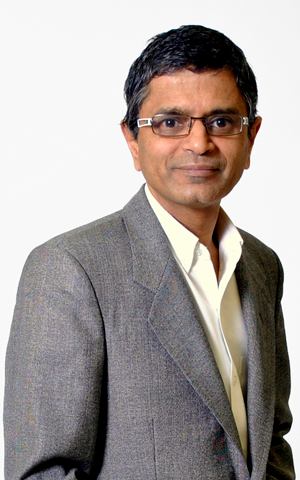
Research finds principles of dharma as a basis for developing sustainable and responsible business
Dr. Suresh Kalagnanam (PhD) is an Associate Professor of Accounting at the Edwards School of Business (Edwards) whose research explores management accounting and control, particularly with respect to two main streams of responsible business and the social return on investment, and spirituality in organizations. Presently, Dr. Kalagnanam is leading a research program that considers how organizations incorporate and embrace principles of spirituality and specifically the concept of Dharma in how they operate and manage their organization. This work has led to innovations in the way we can understand responsible business practices at various levels and is highly multidisciplinary that has created meaningful research collaborations.

Kalagnanam’s research is published in peer-reviewed academic journals including the International Journal of Business Governance and Ethics, International Journal of Productivity and Performance Management, International Journal of Indian Culture and Business Management, Accounting Perspectives, and the IMA Educational Case Journal. He has presented his research nationally and internationally at the Canadian Academic Accounting Association, Administrative Sciences Association of Canada (ASAC) and the International Conference on Responsible Organizations in the Global Context and has served as a reviewer for journals such as: Management Accounting Research, Accounting Perspectives, IMA Educational Case Journal and the International Journal of Education Management.
Spirituality and Organizations
Kalagnanam has a long history of research, with first being exposed to the world of research in his M.Sc. program. He has published extensively and in highly ranked journals in his field starting with a research monograph in CMA Canada, one of the three legacy accounting bodies, as well as in the Accounting, Organizations and Society journal (ABDC ranked A* journal).
Kalagnanam’s research, while within the field of management accounting and control systems, has been evolving over time. Over the past 10 to 12 years, he has narrowed his focus on the kinds of problems and questions he’s aiming to solve and having spent the past 20 plus years learning more about Hindu philosophy, he’s started to incorporate questions about spirituality within the organizational context.
His research is motivated by understanding how spirituality may be incorporated into organizations, and how organizations can use the Hindu spiritual blueprint for living a good life as a way of guiding organizational practices.
Kalagnanam explained that “our scriptures talk about a blueprint for somebody to live a good life, a meaningful life, and an organization is a collection of individuals.” He continued, wondering, “when we look at it from that perspective, will the blueprint work for a collective of individuals within an organization?” This is a question that developed over a decade of work in this area, including deep inquiry and learning along the way.
Much of Kalagnanam’s research projects involve researchers across disciplinary boundaries both within business and beyond.
One of the fundamental conferences he attended that focused on integrating spirituality and management was the 2011 International Conference on Integrating Spirituality and Organizational Leadership. Dr. Kalagnanam collaborated with Dr. Scott Walsworth, a professor in Human Resources and Organizational Behaviour (HROB) at Edwards, where he and Dr. Walsworth presented their paper and later resulted in a publication entitled Applying the Hindu Four Stage Life-cycle Model to Human Resource Management in the International Journal of Indian Culture and Business Management.
Building from this work, he also collaborated with Dr. Rosemary Venne (HROB) in 2015 on a paper entitled Management Control in a Spiritually Charged Organisation which was again published in the International Journal of Indian Culture and Business Management.
As these collaborative projects highlight, this area of research is highly multidisciplinary in that it bridges the diverse areas of accounting, management, and spirituality with organizational behaviour. According to Kalagnanam, because organizations are made up of a collection of individuals, the question about spirituality in organizations becomes a human behaviour question and multiple lenses are needed to better understand this question than from one disciplinary approach.
Dr. Kalagnanam also collaborated with professors in Management and Marketing fields, including Dr. Vince Bruni-Bossio and Dr. William Murphy where they published a chapter on Dharmic Management: Principles and Practice in Organizations (2016) in the Compendium on Integrating Spirituality and Organizational Leadership, Vol. 6: The Cultural Foundations of Organizational Leadership.
In 2017, Kalagnanam was exposed to research on responsible organizations at a conference at Georgetown University, which connected to many of the questions he was already asking around spirituality and organizations.
“Everything I have been thinking about up until that point fit within that theme of ‘what is a responsible organization?’,” Kalagnanam said. “What does the responsibility mean, to whom, and for what. All those kinds of questions.”
These emerging questions and research inspired him to explore this area in greater depth, culminating in a book publication with Dr. Paresh Mishra in 2022 called Managing by Dharma: Eternal Principles for Sustaining Profitability.
This book has two main elements: the first is a discussion around the conceptualizations of dharma and what it means; and the second is highly data driven with around 28 qualitative interviews with current and former leaders in business and government including Senior Executives in companies, primarily in India and Canada. As Dr. Kalagnanam put it, these were “people who are required to think big and the nature of their position is that they think at the very macro level.”
They explored questions such as: “how do organizations conceptualize and interpret dharma?” and “what elements of dharma do they incorporate?”
Overall, the study showed that dharma was a concept that “people were able to relate to and found that it is possible to implement, but it is not easy,” said Kalagnanam. While many of the participants were able to relate to the concept of dharma, identifying that it can be applied at an organizational level, “they also recognize that you have to balance the needs of multiple stakeholders, and that becomes important,” explained Kalagnanam. The study highlighted how leadership needs to be the role model to take this forward.
Kalagnanam described how dharma “comes from a root word in Sanskrit which means sustaining life” which can be thought about in a variety of different ways. “For ourselves as individuals, it might mean to sustain ourselves in the proper manner and behave well, that’s one way to look at it,” he expressed. “We can look at it as sustaining the family, sustaining society. One can really expand on that with this underlying foundation.”
He suggested that this concept can apply to various initiatives such as equity, diversity, and inclusion (EDI) or Indigenous strategy, noting that they are not easy concepts and there are challenges associated with implementing it.
Further to this, he also asked whether there are certain qualities that individuals need to have in order for these strategies to move forward. Kalagnanam shared that, “at the end of the day, we are a collective, but we are also individuals, and it has to happen at both levels.” Using the example of EDI in an organization, Kalagnanam commented that “if our focus is to remove biases and systemic barriers and provide equal opportunity, then we need to be able to understand the idea of acceptance and adaptability, compassion, openness, respect, and tolerance.” Many of these underlying human values and qualities align with the concept of dharma.
Kalagnanam shared that they developed a way of conceptualizing dharma within organizational practice using three vertices of a triangle. The first is to think of dharma as a goal with a focus on educating people about the values, the second is using the principles as a foundation for planning and decision-making and the third is dharma in practice. The goal of the triangle is to “guide people individually and the collective units to make proper decisions that could help improve organizational well-being,” said Kalagnanam.
It was over the past 10 to 12 years that this type of research materialized for Dr. Kalagnanam and the key questions that underpin his work asks: “what does responsible behaviour mean and how do organizations try to be responsible?” explained Kalagnanam.
Social Return on Investment (SROI)
Another related stream of research Kalagnanam is engaged in is on the social return on investment (SROI) with Dr. Isobel Findlay through the Community-University Institute for Social Research (CUSIR). This stream of research focuses on SROI methodology and examines how to develop financial proxies, one of the inputs that goes into the SROI methodology. It is also community focused research that aims to provide benefits to community partners.
Much of this line of research and particular projects involve commissioned works with different agencies and organizations such as Prairie Hospice Society where they implement the SROI methodology. He is currently involved in three SROI projects.
As Kalagnanam explained, while the SROI methodology is constant in terms of its application, the project topics vary widely. Some of his work on Equity, Diversity, and Inclusion (EDI) is also linked to his work on SROI. According to Kalagnanam, “that leads to its own challenges and it’s kind of interesting too because you are taking a single methodology and applying it to a totally different context.”
For Dr. Kalagnanam, this type of research is “one where you develop a rapport with the community partner, and it is directly a benefit to them.”
He shared how it is also indirectly beneficial in terms of the development of the methodology which contributes to the academic field and teaching. “We can talk about SROI in the classroom, and we can also develop an academic paper that brings in the lessons we have learned from these projects,” he said.
Kalagnanam is innovating accounting research through applying a fresh perspective and unique lens by examining spirituality and organizations and the social return on investment. At the same time, there are clear overlaps with traditional financial and performance reporting and management control research.
What is most important to Dr. Kalagnanam is ensuring the research he conducts has some practical value and that is of benefit to people and society.
Funding Acknowledgment: This research has been funded by the Edwards School of Business Research Committee.
To learn more about Suresh Kalagnanam’s research, check out his profile page!
PUBLICATION HIGHLIGHTS
Mishra, P. and Kalagnanam, S. (2022). Managing by Dharma: Eternal Principles for Sustaining Profitability. Springer International Publishing. Book series: Palgrave Studies in Workplace Spirituality and Fulfillment. ISBN: 978-3-030-90668-9
Kalagnanam, S. and Rajeev, P. N. (2021). Implementing Mandatory Corporate Social Responsibility in India: Assessing Progress Made by Corporates and NGOs. International Journal of Business Governance and Ethics. Accepted June 4, 2021. DOI: 10.1504/IJBGE.2021.10041188
Rigby, J., Kobussen, G., Kalagnanam, S. and Cannon, R. (2021). Implementing Responsibility Centre Management in a Higher Educational Institution. International Journal of Productivity and Performance Management. https://doi.org/10.1108/IJPPM-05-2020-0218. Accepted December 22, 2020.
Klassen, M., Kalagnanam, S. and Vasal, V.K. (2019). Managing Values and Financial Accountability: The Case of a Large NGO. International Journal of Indian Culture and Business Management. Vol. 19, No. 1, pp. 103–127.
Kalagnanam, S., W. Murphy and V. Bruni-Bossio. (2016). Dharmic Management: Principles and Practice in Organizations. Sengupta, S. (ed.). Compendium on Integrating Spirituality and Organizational Leadership, Vol. 6: The Cultural Foundations of Organizational Leadership. New Delhi: ISOL Publications, pp. 113-119.
Kalagnanam, S. and R. Venne. (2015). Management Control in a Spiritually Charged Organisation. International Journal of Indian Culture and Business Management. Vol. 10, No. 1, pp. 1-15.
Walsworth, S. and Kalagnanam, S. (2013). Applying the Hindu Four Stage Life-cycle Model to Human Resource Management. International Journal of Indian Culture and Business Management. Vol. 6, No. 4, pp. 507-520.
